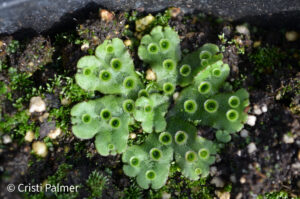
Data in this report were generated to evaluate several products for post-emergent control of liverworts (Marchantia sp.). Liverworts are among the most serious weeds of container grown ornamentals.Classified as bryophytes these simple plants thrive on water and nitrogen for reproduction but can also survive long dry periods. The Society of American Florists ranked liverwort seventh in a national survey for worst nursery pests while Oregon regards it as No. 1. (Miller, Laura, Ornamental Outlook, Liver What?, 2007). During the 2004 and 2009, IR-4 Ornamental Horticulture Workshops, a project was prioritized to screen for efficacious products to manage post-emergent liverwort in container grown ornamentals grown primarily under cover in greenhouses or hoop houses, use sites with very few registered herbicides. This research was conducted across the United States in 1976, 2005, 2006, and 2009 through 2011 to evaluate several registered products for liverwort control.
Treatments with proven effectiveness in multiple trials include Bryophyter (oregano oil) at 2% v/v, Greenmatch (d-limonene) at 20% v/v , Racer (ammonium nonanoate) at 5% v/v, Scythe (pelargonic acid) at 5-10% v/v, SureGuard (flumioxazin) at 0.375 lb ai/A, Terracyte Pro (sodium carbonate peroxyhydrate) at 10 lb/1000 sq. ft., V-10233 (flumioxazin) at 10 fl oz/A, and WeedPharm (acetic acid) 10- 20% v/v. In limited experiments, Broadstar 0.25G (0.25 lb/A), indaziflam (0.065 lb ai/A), Ronstar 2G (4.0 lb ai/A) and EC (2 lb ai/A) and Showcase 2.5G (2.5 lb ai/A) also demonstrated good control. Contact type treatments such as Scythe and Bryophyter were fast acting but generally required more than one application to remain effective (>80% control) during the trial period. Treatments with unacceptable or inconsistent liverwort control include Champ, FlowerPharm, Freehand, Junction, M-Pedi, Quicksilver, Sporan, Sporatec, and Xeroton. In a single trial the following products were effective in controlling bittercress and crabgrass, as well as, liverwort: Bryophyter, GreenMatch, Scythe, SureGuard, and WeedPharm. Silwett alone also controlled these weeds but was ineffective in controlling liverwort.
The results from this study successfully identify several options for postemergent control of liverwort. Further research should focus on products that can be safely applied as a conventional application or as a dormant treatment to container grown ornamentals which provide residual control of liverwort, as well as, other weeds.


